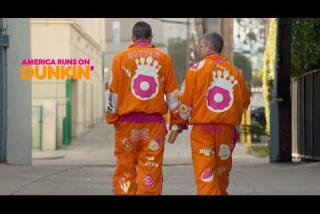Pop tunes are welcome in the movies, directors say, as long as it’s in service of the plot
If you want to know what tunes will be on the next “Guardians of the Galaxy” movie, you don’t have to wait until post-production — just visit director James Gunn during filming. For him, the music in his movies is so “baked in” he’s playing it on set during shooting.
“With ‘Guardian’ movies, it isn’t just about fitting songs into the screenplay, it’s about the actors knowing the songs,” says Gunn. “The way you move a camera is different if you don’t know what the music is. I remember working on my first movie and realizing some people don’t even edit to the song. Why would you ever do that?”
Movie soundtracks have undergone a revolution in recent years, in no small way thanks to the success Gunn has had with his two “Guardian” movies, each of which featured no fewer than 12 classic rock, pop and R&B tunes. He’s not alone — movies this award season ranging from “Detroit” to “I, Tonya” and “Battle of the Sexes” all weave classic and sometimes obscure music from multiple genres into their storytelling and soundtracks in a way that feels critical to the plots themselves.
Scores have long been tied to the emotional layer of movies; modern music worked its way in over the decades thanks to directors like Martin Scorsese (“Goodfellas”), Neil Jordan (“The Crying Game”) and Sofia Coppola (“Marie Antoinette”). But there’s a darker side, too — as when the inclusion of pop tunes turns into more of a marketing exercise than an expansion of the film’s emotional layer.
Today, a film like “Battle” may have the full range of the 1970s to choose from, but music supervisor Steven Baker picked only three songs from the period for the soundtrack, including pairing George Harrison’s “What Is Life” with a montage contrasting Billie Jean King’s and Bobby Riggs’ training styles.
“It’s like anything else in life; it can work beautifully with the right song and editing and imagery, but by the same token, if it’s just a placeholder to make the film more relatable — the audience can be manipulated,” he says. “All of these decisions are made carefully, and with a lot of soul involved.”
In “Guardians,” Gunn’s song-heavy soundtrack helps audiences access Peter Quill’s (Chris Pratt) relationship with his late mother, who made the mix tapes in the first place. But he understands that without specific purpose, what’s known as a “needle drop” song in a film can be a mistake.
“There are movies that have too many songs,” he says. “Every establishing shot has a pop song playing over it. That type of MTV-inspired filmmaking is not really my thing.”
“Detroit” music supervisor George Drakoulias says the 14 songs on his soundtrack all match with the subject of the film, the era (1967) and the location (Detroit, naturally). But he’s loath to adhere to a particular formula when it comes to deciding how many songs to load into a movie.
“There’s no one thing that’s right for every movie,” he says. “A lot of stuff happens in post, or you discover stuff in the editing room. As long as it suits the film, there’s no wrong answer. It’s not a black-and-white issue.”
There is a temptation to choose tunes for a specific purpose in telling a story; “I, Tonya’s” director Craig Gillespie knew he was being a bit on-the-nose by including Supertramp’s “Goodbye Stranger” in a scene where Tonya (Margot Robbie) is preparing to leave her husband, but for him the use of the song was ironic.
“It’s a matter of judgment,” he says. “It’s a fine line: Are you taking away or adding? All of these songs are well-known and come with baggage. That can be a good thing, if it puts you in a state of mind — or it can be distracting.”
Either way, the use of the soundtrack as mere marketing device seems to have gone by the wayside, which has freed directors and music supervisors — many of whom grew up with music videos and making their own mix tapes — to paint carefully with tunes.
Or, in the case of Gunn, to make sure all the ingredients are included in the final batch. “When you’re baking a cake, you don’t leave out the butter and then put a big slab on when you’re cooking,” he says. “If you just go with the cool song of the moment, you miss the point. Music can be a crutch without an emotional element to it. And I hope we never, ever do that.”
WATCH: Video Q&A’s from this season’s hottest contenders »
More to Read
From the Oscars to the Emmys.
Get the Envelope newsletter for exclusive awards season coverage, behind-the-scenes stories from the Envelope podcast and columnist Glenn Whipp’s must-read analysis.
You may occasionally receive promotional content from the Los Angeles Times.






